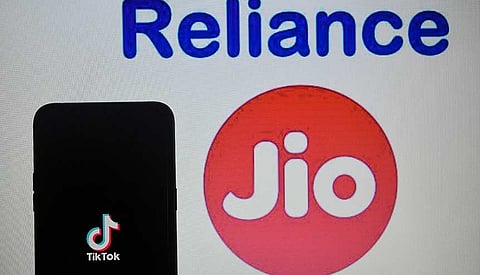
- Home
- About
- Globally Speaking
- Videos
- Podcast
- Geopolitics
- Industry
- SIGN UP

Even if the proposed sale of ByteDance's wildly popular app goes through, the Modi government will want to ensure that any Trojan horses are removed to prevent any possibility of it being used to spy on Indians.
As the buzz over the speculated sale of TikTok's operations in the US, and some other countries to an American company gathers pace, there is also talk that the Chinese company is in negotiation with Reliance Industries, controlled by billionaire Mukesh Ambani, to re-enter India.
Have you read
Indian telecom, tech and data beckon global investors
India plays the smart game by effectively thwarting Chinese investment
Why India's IT sector is on the cusp of a global metamorphosis
Indian telcos' revenue grows strongly defying coronavirus: Fitch
There is no clarity yet on whether either or both of these transactions will convince the Narendra Modi government to lift its ban on the Chinese social media app. It may be recalled that India had banned 59 Chinese apps in the aftermath of China's unprovoked attack on Indian troops in Ladakh and its continuing transgression along the Line of Actual Control (LAC).
This ban effectively opens up the world's second-largest Internet market, which is also the second-largest market for smartphones globally, to a host of domestic apps. It also leaves the field open to apps developed by US and other friendly countries. This market, already valued at several billions of dollars, will multiply in value as India's Net penetration rises from about 700 million users now and inches closer to China's figure of more than 900 million. The number of smartphone users, currently at 450 million, is also expected to expand exponentially over the next few years.
Then, 5G telecom is expected to be launched in India next year. India's soon-to-be launched 5G technology backbone is overlaid with higher internet and smartphone penetration can prove to be a huge bonanza for India's three major mobile telecom companies - Jio, Airtel and Vodafone-Idea. No wonder, deep pocketed foreign investors such as Facebook, Google, and a host of large funds have bought almost a third of Jio Platforms, the company that houses Reliance's technology assets. There are reports of other large investors talking to Airtel and Vodafone-Idea about acquiring stakes in them as well.
Also read:
India needs legislature to address telecom AGR dues
It isn't hard to imagine why such deep pocketed foreign investors can't seem to have enough of the Indian telecom and technology sector. That's because data will be in the 21st century what oil was in the 20th - a virtual goldmine.
It isn't hard to imagine why such deep pocketed foreign investors can't seem to have enough of the Indian telecom and technology sector. That's because data will be in the 21st century what oil was in the 20th - a virtual goldmine, literally. And India will be the cynosure of this market once it opens up.
But to unlock the keys to this goldmine, India will have to address some key challenges first. The most important is the issue of resolving the financial crisis faced by Indian telecom companies over adjusted gross revenue (AGR) dues. A Supreme Court order has placed a more than $20-billion burden on Indian telecom companies. A final judgment on the telcos' plea for easy payment terms is expected soon.
Further, the government may want to reconsider the reserve price for 5G spectrum that all the telecom operators and most analysts have called “prohibitively expensive” compared to countries such as the US, and South Korea.
The government may want to reconsider the reserve price for 5G spectrum that all the telecom operators and most analysts have called “prohibitively expensive” compared to countries such as the US, and South Korea.
There are strong indications that the government is alive to these challenges and is working to address them. These need to be resolved so that the humungous value that lies locked up in India's telecom and technology sector can be unlocked.
But India will benefit only if it has control over the data that users in this country will generate. That is why the government should consider all aspects very carefully before considering a lifting of the ban on TikTok even if the app is sold by its Chinese parent.